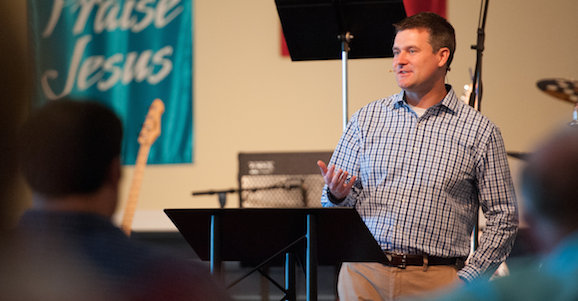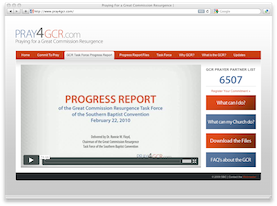GCR Component #1: A New Attitude
April 25, 2010 at 01:42 PM
The Great Commission Resurgence Task Force released a progress report back on February 22, 2010. They have made clear this is not the final report, that some changes and adjustments will be made. The final report is scheduled to be released a little more than a week from now, so some of what I write in this series may become obsolete pretty quickly. But I still think its worth walking through the six components of the progress report and examining each one.
I write as someone who has been supportive of the GCR movement from the beginning. I voted last year (along with around 95% of messengers) for the task force to be named by Johnny Hunt. I was pleased, for the most part, with those chosen to be on the task force, especially after a few were added. After seeing the progress report, I am still supportive of the movement. All that's just to let you know the perspective I'm coming from.
Even though there has been relatively little discussion of it so far, it's difficult to underestimate the importance of Component #1. This is foundational to the other components. It's in many ways, I believe, a summary statement of what the rest of the components seek to accomplish.
The Text of Component #1:
There are two aspects that deserve highlighting: First, a missional vision, and second, a new and healthy culture described by eight core values.
A Missional Vision
Component #1 calls Southern Baptists to a "clear and compelling missional vision." Some might point out that using the words 'clear' and 'missional' together is a little ironic since it might be hard to define 'missional' with any kind of clarity in the first place. It's a word that's been used by people in different ways and with a wide range of intended meanings behind it.
So what does 'missional' mean and what does the task force mean by it? Missional means, in my understanding, being wrapped up in the mission of God as a lifestyle. In other words we see the Great Commission, the spread of the gospel of God's reconciling sinners through faith alone in Christ, as the job of every Christian, not just the jobs of pastors and missionaries. It means we see our own places (towns, cities, workplaces, families, etc...) as mission fields. We have no home field. Everywhere we go is an away game. You look at your life and every day as a mission trip whether you're on another continent or living in the same community where you were raised.
So for Southern Baptists to have a missional vision is for us to see ourselves as missionaries and the places we go daily as mission fields. This is emphatically not to the exclusion or to diminish those full-time, vocational missionaries we send various places. In fact, we we understand 'missional' correctly, we are going to see the importance of missions all the more. But there's a shift from the us (non-missionaries) and them (missionaries) mentality to a way of thinking that says we're all on the same team, working toward the same goal, only in different locations.
'Missional' is a newer term and therefore its definition is still somewhat fuzzy to many Southern Baptists. And its also been misused at times by people who do not have the gospel as the focus of their message to the world. But these shouldn't keep us from rallying around this concept. Can you imagine what the SBC would look like if our people and churches grasped this vision? It's staggering to imagine the impact we could have.
A New and Healthy Culture
Al Mohler reminded us recently that we have a reputation and tendency to be grumpy. Some might say it's easier to define Southern Baptists by what we're against than what we're for. We could point out examples of where our interaction with each other is filled more with sarcasm and cynicism than love and trust.
Our Southern Baptist culture, in many areas, is not a healthy example of how Jesus' disciples should act toward one another. The eight core values we should operate with are, according to the task force: Christ-likeness, truth, unity, relationships, trust, future, local church, and kingdom. When we are at our best, these items describe us well. But until these qualities begin to describe the norm instead of the ideal, we will rightfully keep our reputation as a grumpy, disagreeable group.
The Bible tells us that we should live at peace with everyone, so long as it depends on us. Too often we look like we're ready to pick a fight with anyone available. Mark Driscoll, Disney, calvinists, Ed Stetzer, Barak Obama, private-prayer language practicers, bloggers, anyone who's not 'Baptist enough', Rick Warren, etc... When it comes to other believers, when will Southern Baptists emphasize what we have in common more than what separates us? Can't we rejoice loudly at how many lives Rick Warren has touched with the gospel and have some quiet, private discussions if we wish he used a different methodology?
I'm thankful for the task force for calling us to put aside abrasiveness for a new, healthier culture.
If you want to hear the task force report on Component #1, watch the video at http://www.pray4gcr.com/ between 26:08 and 31:30. You can also download the audio file of the report here.
I write as someone who has been supportive of the GCR movement from the beginning. I voted last year (along with around 95% of messengers) for the task force to be named by Johnny Hunt. I was pleased, for the most part, with those chosen to be on the task force, especially after a few were added. After seeing the progress report, I am still supportive of the movement. All that's just to let you know the perspective I'm coming from.
Even though there has been relatively little discussion of it so far, it's difficult to underestimate the importance of Component #1. This is foundational to the other components. It's in many ways, I believe, a summary statement of what the rest of the components seek to accomplish.
The Text of Component #1:
We believe in order for us to work together more faithfully and effectively towards the fulfillment of the Great Commission, we will ask Southern Baptists to rally towards a clear and compelling missional vision and begin to conduct ourselves with core values that will create a new and healthy culture within the Southern Baptist Convention.
There are two aspects that deserve highlighting: First, a missional vision, and second, a new and healthy culture described by eight core values.
A Missional Vision
Component #1 calls Southern Baptists to a "clear and compelling missional vision." Some might point out that using the words 'clear' and 'missional' together is a little ironic since it might be hard to define 'missional' with any kind of clarity in the first place. It's a word that's been used by people in different ways and with a wide range of intended meanings behind it.
So what does 'missional' mean and what does the task force mean by it? Missional means, in my understanding, being wrapped up in the mission of God as a lifestyle. In other words we see the Great Commission, the spread of the gospel of God's reconciling sinners through faith alone in Christ, as the job of every Christian, not just the jobs of pastors and missionaries. It means we see our own places (towns, cities, workplaces, families, etc...) as mission fields. We have no home field. Everywhere we go is an away game. You look at your life and every day as a mission trip whether you're on another continent or living in the same community where you were raised.
So for Southern Baptists to have a missional vision is for us to see ourselves as missionaries and the places we go daily as mission fields. This is emphatically not to the exclusion or to diminish those full-time, vocational missionaries we send various places. In fact, we we understand 'missional' correctly, we are going to see the importance of missions all the more. But there's a shift from the us (non-missionaries) and them (missionaries) mentality to a way of thinking that says we're all on the same team, working toward the same goal, only in different locations.
'Missional' is a newer term and therefore its definition is still somewhat fuzzy to many Southern Baptists. And its also been misused at times by people who do not have the gospel as the focus of their message to the world. But these shouldn't keep us from rallying around this concept. Can you imagine what the SBC would look like if our people and churches grasped this vision? It's staggering to imagine the impact we could have.
A New and Healthy Culture
Al Mohler reminded us recently that we have a reputation and tendency to be grumpy. Some might say it's easier to define Southern Baptists by what we're against than what we're for. We could point out examples of where our interaction with each other is filled more with sarcasm and cynicism than love and trust.
Our Southern Baptist culture, in many areas, is not a healthy example of how Jesus' disciples should act toward one another. The eight core values we should operate with are, according to the task force: Christ-likeness, truth, unity, relationships, trust, future, local church, and kingdom. When we are at our best, these items describe us well. But until these qualities begin to describe the norm instead of the ideal, we will rightfully keep our reputation as a grumpy, disagreeable group.
The Bible tells us that we should live at peace with everyone, so long as it depends on us. Too often we look like we're ready to pick a fight with anyone available. Mark Driscoll, Disney, calvinists, Ed Stetzer, Barak Obama, private-prayer language practicers, bloggers, anyone who's not 'Baptist enough', Rick Warren, etc... When it comes to other believers, when will Southern Baptists emphasize what we have in common more than what separates us? Can't we rejoice loudly at how many lives Rick Warren has touched with the gospel and have some quiet, private discussions if we wish he used a different methodology?
I'm thankful for the task force for calling us to put aside abrasiveness for a new, healthier culture.
If you want to hear the task force report on Component #1, watch the video at http://www.pray4gcr.com/ between 26:08 and 31:30. You can also download the audio file of the report here.
blog comments powered by Disqus



